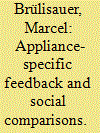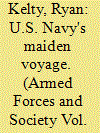| Srl | Item |
| 1 |
ID:
174986


|
|
|
|
|
| Summary/Abstract |
The provision of feedback about individual electricity consumption is a widely used approach to promote pro-environmental behavior. This form of feedback typically invokes social comparisons by informing households about their aggregate electricity consumption relative to others. While previous research has shown that aggregate consumption feedback translates into significant energy savings, the potential for further reductions may remain untapped because households lack knowledge about their appliance energy consumption patterns. In this paper, we present evidence from a field experiment, where we provide residents with feedback about their electricity consumption, specific to a high-energy use appliance (i.e. air-conditioner). We provide the relevant social norm information by varying the reference group of each resident. We find that our appliance-specific feedback is a powerful tool to curb electricity consumption. Residents significantly reduce their average air-conditioning usage by 17% in our treatment groups. Notwithstanding, our effects are not driven by comparative feedback with respect to different reference groups. We interpret this as encouraging evidence to promote the use of appliance-specific feedback to realize energy savings.
|
|
|
|
|
|
|
|
|
|
|
|
|
|
|
|
| 2 |
ID:
175254


|
|
|
|
|
| Summary/Abstract |
The existing climate models ignore the behavioral anomalies of households and conclude that the optimal environmental tax rate should comove with business cycles. However, this assumption has received extensive criticism recently. To this end, this paper studies the optimal emissions tax rate when households are bounded rational. In particular, we calculate the optimal climate policy in a dynamic stochastic general equilibrium (DSGE) model that features households with habit formation (internal habits) and social comparisons (external habits). Compared to the benchmark model without consumption externality, the social comparisons model amplifies consumption volatility but produces a similar response of pollutant emissions in the presence of the three types of economic shocks considered. In contrast, the habit formation model decreases the volatility of both consumption and pollutant emissions. In contrast to the previous result that the optimal emissions tax rate should be procyclical, we find that the social comparisons model largely mitigates the procyclicality of optimal emissions tax rates, and the optimal emissions tax rates under the habit formation model remain constant in response to all the economic shocks considered.
|
|
|
|
|
|
|
|
|
|
|
|
|
|
|
|
| 3 |
ID:
082694


|
|
|
|
|
| Publication |
2008.
|
| Summary/Abstract |
The U.S. federal government is increasingly civilianizing the military as a manpower-management strategy. Effects of this policy are not well understood. Data from a case study of civilian mariners integrated with sailors on a U.S. Navy ship were analyzed to determine the effects of social comparisons on each group's job satisfaction, organizational commitment, and intentions to remain with their current employer. Results indicate both sailors and civilian mariners view sailors as less advantaged compared to their civilian peers. The effect of these social comparisons on each group's satisfaction, commitment, and retention attitudes was mixed, having a significant negative impact for sailors but not for civilian mariners. These results identify an unintended negative consequence of the decision to integrate civilian and military personnel in an operational unit. The way civilian mariners were integrated is discussed as a possible reason for the differential effect of social comparisons between the two groups.
|
|
|
|
|
|
|
|
|
|
|
|
|
|
|
|